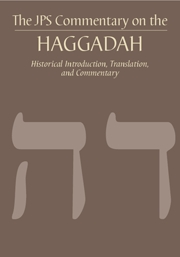 J-BOM (the Jewish Book of the Month club) officially starts today. (In case you don't know what I'm talking about, click here.)
J-BOM (the Jewish Book of the Month club) officially starts today. (In case you don't know what I'm talking about, click here.)Hopefully you've ordered your copy of The JPS Commentary on the Haggadah. I intend to make several posts about the book over the coming month, in connection to the upcoming Pesach holiday.
Here's a taste of what's to come, from the book's foreword by David Stern. (No, not that David Stern.) After opening by talking about how beloved the Passover haggadah is, Stern writes:
[The] proclivity for contemporizing the haggadah can be traced back to the haggadah text itself. In one of its most famous passages, it instructs its reader, the participant in the seder, "to see him or herself as though they had gone out of Egypt." Historically, Jews have fulfilled this instruction in different ways, sometimes even acting out the Exodus by marching around the seder table! Since the early Middle Ages, however, probably the most typical way Jews have made the haggadah speak to their contemporary concerns and needs has been through the act of composing commentaries on it and then drawing on their elaborations and interpretations at the seder. These commentaries have been of every conceivable type--midrashic, legalistic, homiletical, ethical, philosophical, and mystical. And each has added a different and additional layer of meaning to the ritual.I'd like to suggest that we take Stern's observation as an exhortation: that as we read the haggadah through this commentary, we also engage in creating our own commentaries on the haggadah, commentaries which reflect our own particular story, giftings, and passions.



No comments:
Post a Comment